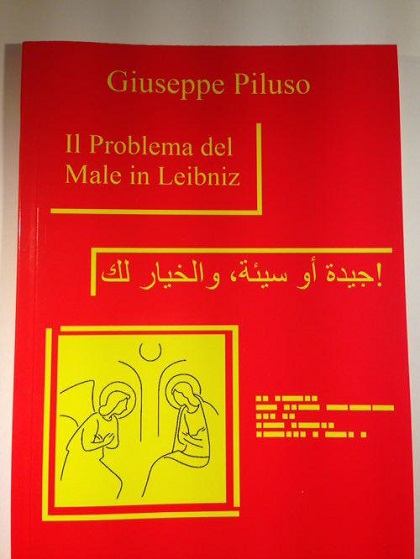They wrote about me… (2015 – 2017)
Giuseppe Piluso – book title: “THE PROBLEM OF EVIL IN LEIBNIZ”
When we start to analyze a philosophy book, in this specific case: Giuseppe Piluso, The problem of evil in Leibniz, Edizioni Nuova Santelli, there are always different observation optics and various parameters of possible evaluation. Leibniz sees, in the order of the world, the free creation of God and strives to reconcile mechanism with finalism, the new science of nature with the principles of metaphysics.
The basic concept on which all the philosophical planning of Leibniz is based can be summarized as follows: there is an order, not geometrically determined and therefore necessary, but spontaneously organized and therefore free. Ultimately, Leibniz researches or realize order in all fields of human knowledge. For the German philosopher, God is the one who has chosen, among the various possible orders of the universe, the best or the most perfect. In the introduction Giuseppe Piluso focuses on the working method he followed: “The role that the problem of evil plays in the thought of a philosopher like Leibniz and which assumes within the system he built around the Theodicy, is somewhat ambivalent. The question of the Unde malum? and the good-evil ethical binomial do not constitute the pivot of the Leibnizian system, yet it is precisely through the non-centrality of their position that two fundamentally important but also opposite aspects of Leibniz’s Theodicy emerge: the rationalization of its entire system and the irenism of natural religion. The term “theodicy” indicates a search aimed at exonerating God from the accusation of having created evil in the world”. This position is interesting. Meanwhile, a fact: evil exists and is present, or potentially present, everywhere and in every single individual. In any case, following the evolution of this thought, the problem of evil, with all its richness and its range, assumes a prominent role, becoming the nodal point around which the Leibnizian ethics develops.
In the Christian world, the problem becomes a place of common exchange and reflection for philosophy and theology, which form the basis of all tradition. Piluso’s analysis continues: “In an originality linked to tradition, which is the one with which Leibniz faces this problem, two fundamental elements emerge for the age and the context in which the author himself lives and works: the role and power of reason and the idea of a universal irenism. The Theodicy, although possessing a theological starting point, is actually a true philosophical work, a rational system, built around and starting from the supreme Reason, or, in the Leibnizian view, God”. It is effective to contextualize and historicize the era of reference as Giuseppe Piluso does. Each thought is the child of the age of belonging and represents its free development in the future. “In the reconciliation between faith and reason, the problem of evil is observed from a new angle: there are truths of faith inaccessible to reason, but this cannot but be seen by Leibniz as a gift made by God to man to live in a world that is understandable to everyone. For Leibniz, the limit of reason comes from human imperfection, but its strength and its power mean that a problem such as that of evil is not left to irrationality. However, the most problematic aspect of Leibniz’s thought was that of incorporating the entire system of his Theodicy into a complete rationalization of reality which has its apex in God and which has absorbed the ethical-religious inquiry in a logical-mathematical solution; the merit that is recognized instead in the Leibnizian Theodicea is certainly that of representing the organicity of reality in universal harmony: the μάθεσις [matesis] and the ποίεσις [poiesis] are therefore both those ways which, in a very different way, have allowed Leibniz to approach the reading of reality and the world”. The Faith and Reason clash explodes. God, whose knowledge is perfect, is able to see in the notion of every substance the reason for all his predicates. This does not mean that the individual substance needs to act in a certain way. Thus we arrive at the truth of fact and the truth of reason. The focal point of Leibniz’s philosophical insights. Which are well represented in this fascinating essay. “The highest of his aspirations, which combines all the others, was to establish in humanity a universal peace based on knowledge. The Leibnizian irenism, which crossed the philosopher’s entire life and led to the Theodicy, preserving its fundamental qualities and defects, brings with it the urging to try to ensure that faith does not remain blind, but thanks to reason, it opens up its eyes and also open them on the mystery that reason can recognize, but not probe. From this point of view of unity, the problem of evil is evaluated as a part of the whole, a part which, despite its negative aspect, contributes to the ornamentation of the whole and, at the same time, is reduced to a partial and inadequate perspective.” However, in the recognition of the limit by man, there is inherent another type of recognition: that of an equality among rational beings, belonging, beyond one’s belief, to a universal divine kingdom. Giuseppe Piluso, with great mastery of the subject, makes his own the concept that man never has a complete notion of individual substance and is therefore forced to derive from the experience or from history the attributes that refer to it.
“Leibniz, to indicate the problem of the relationship between the justice of God and evil, intertwines basic themes of the philosophical and theological tradition, such as the love of God, providence, the divine presence and human freedom, and others, more properly philosophical, such as those concerning the concepts of contingency and harmony, among which stands out, due to problematic depth, that of freedom and necessity”. The problem of the presence and origin of evil configures the scenario within which the Leibnizian Theodicea unfolds as a doctrine of God’s justice. In general, evil comes from ideas, which God did not produce through an act of his will; God is therefore not at all the author of the essences, according to Leibniz, as they are only possibilities, but there is nothing existing that he has not decreed to give existence to.
It is this concept that satisfies at the same time the divine wisdom, power and goodness, without excluding the presence of evil. Leibniz also never denies the existence of evil, on the contrary he distinguishes it, according to tradition, into metaphysical evil, physical evil and moral evil, but often repeats that “the evil of the parts is the good of whole”, since the same good comes to coincide with the common, universal good. The problem of evil in Leibniz, the beautiful book written by Giuseppe Piluso, is a new pillar of cultural essays for the search of the active force that the Author has within himself who strives to represent the good trying to defeat the evil that he certainly has known, but with intelligence, works so that in the eyes of people good can always triumph. And it can always be pursued.
Giuseppe Piluso is a fine Author, tendentially positive, with a precise language and argumentative and always contemporary contents. To say it as Leibniz for Giuseppe Piluso everything is spirit and life because everything is strength. The strength of ideas, by the author Giuseppe Piluso.
Maria Francesca Mancinelli
Correspondant for news agency Ansa – Rome



